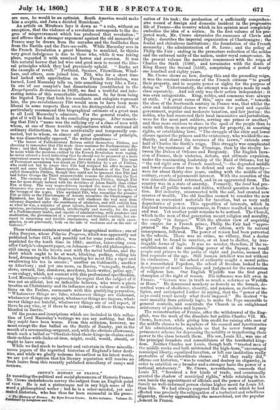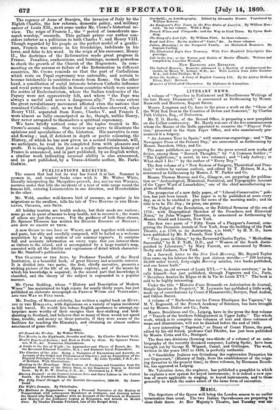CROWE'S HISTORY OF FRANCE. • IN recording the political and social
phenomena of Historic France, Mr. Crowe undertakesto survey the subject from an English point of view. He is not a picturesque nor in any high sense of the word a philosophical writer ; but he is a sober-minded, yet ani- mated historian, who has thus far been successful in the prose- • The History of Prance. By Eyre Evans Crowe. In five volumes. Volume II. 4'04iSbod .71.0nginan and Co. oution of his task ; the production of a sufficiently comprehen- sive record of foreign and domestic incident in the progressive life of France—the country which in his opinion most completely embodies the idea of a nation. In the first volume of his pro- Pcted work, Mr. Crowe chronicles the successes of Clovis and Pepin ; describes the imperial organization of Charlemagne; the feudal and chivalrous institutions; the foundation of the French monarchy ; the administration of St. Louis ; and the policy of Philip the Fair • ending in the premature reduction of the nobles and the enforced unity of the nation, under royal compression. In the present volume the narrative commences with the reign of Charles the Sixth (1380), and terminates with the death of King Henry the Second (1559), comprising a period of nearly one hundred and eighty years. Mr. Crowe shows us how, during this and the preceding reign, it was the constant endeavour of the French citizens " to guard their property, and to acquire power or rights for the purpose of doing so." Unfortunately, the attempt was always made by each class separately. And not only was their action independent ; it was even antagonistic. King, nobles, and commons were always at strife. "A great cause of this," says our author, " towards the close of the fourteenth century in 1 ranee was, that whilst the civic and industrial classes were anxious for good and equable government, regular and moderate taxation, and fair justice ; the nobles, who had recovered their local immunities and jurisdiction, were for the most part soldiers, serving one prince or another," and thus more anxious to share in the spoil of the people than to unite with them in securing protection for property, in asserting rights, or establishing laws. " The struggle of the curio and lower classes against the princes and the aristocracy, who wielded the au- thority, and shared the revenues of the clown," extends over half of Charles the Sixth's reign. This struggle was complicated first by the resistance of the Flemings, then by the rivalry be- tween the Dukes of Orleans and Burgundy. The English Inva- sion of France, their victories, defeats, and ultimate expulsion, under the reanimating leadership of the Maid of Orleans, but by " the red right arm of French manhood,"—the degraded middle and lower classes that rose to defend and save the monarchy— were for about thirty-five years, ending with the middle of the century, events of paramount interest. With the cessation of the war domestic discord returned, and in an aggravated form. The country was in a state of anarchy. Formerly, the land had pro- vided for all public wants and duties, without question or hesita- tion. But industry, unconnected with the soil, had created new sources of wealth. The old families seemed to consider the new classes as convenient materials for taxation, but as very unfit
i
depositories of power. This opposition of interests, which in England terminated in compromise, in France resulted in anarchy and war. Yet another point remains to be noticed. The Church, which to the men of that generation meant religion and morality, was really " in danger." With the ulterior view of acquiring the empire for a French prince, Philip the Fair had "appro- priated " the Popedom. The great schism, with its natural consequences, followed. The power of reason had been perverted in the schools. There was no crime, no villany, that a doctor might not be found to sanction, or at least to shelter, by irre- fragable forms of logic. It was no wonder, therefore, if the re- establishment of the controling power of the Papacy, to recall people and princes to the paths of right and justice, seemed the first requisite of the age. Still human intellect was not without its vindicators. If the school of authority sought a moral police in a resuscitated Popedom, the school of freedom looked to the development of man's faculties and judgment for the restoration of religious law. Our English Wycliffe was the first great champion of the right of reason. His influence was felt even in France. " Gerson was in truth as much a reformer as Wycliffe or Huss." He denounced monkery as fiercely as the former, de- scribed vows of obedience, chastity, and penance, as factitious re- ligion, and anticipated Luther in saying, that the " power of the keys could remit merely what itself imposed." He desired "to save morality from princely logic, to make the Pope amenable to general councils, and constitute the Church in an enlightened aristocracy of prelates and laymen." The reconstruction of France, after the withdrawal of the Eng- glish, was the work of the dissolute but politic Charles VII. Mr. Crowe, however, while giving him credit for raising able men of
the middle classes to be members of his council and functionaries of his administration, reminds us that he never formed any permanent scheme for depressing the nobility or transferring their power to the class beneath them. His son, Louis XI., was one of the principal founders and consolidators of the territorial king- dom. Neither Charles nor Louis, though both "trusted men of the middle ranks and both mistrusted the high-born," encouraged municipal liberty, equalized taxation, or left our institution really
protective of the subordinate classes. "All they really did,'
affirms our historian, " was to combat and destroy an oligarchy, in order to establish on a broader and a stronger basis the power of a national aristocracy." Mr. Crowe, nevertheless, conceeds that Louis XI. " favoured a few kinds of trade, and occasionally granted the shadow of municipal rights," while retaining in his own hands the Appointment of officials and the power of taxation. Surely no well-informed person claims higher merit for Louis XI. than this. We had always supposed that the work whioh he had
effected was precisely the subjugation of a turbulent and rebellious oligarchy, thereby aggrandizing the monarchical, not the popular Element in France.
The regency of Anne of Beaujeu, the invasion of Italy by the Eighth Charles, the law reforms, domestic policy, and military career of Louis MIL, next come under Mr. Crowe 's historical re- view. The reign of Francis I., the " period of immoderate mo- narch worship,' succeeds. This gallant prince our author con- .siders inferior as a politician to both Charles V. and Henry VIII. Though regarded by his people as the perfect model of a gentle- man Francis was untrue in his friendships, indelicate in his loves, and false to his word. In the reign of his successor, Henry II., the doctrines of the Reformation made great progress in France. Penalties, confiscations, and burnings, seemed powerless to check the growth of the Church of the Huguenots. In com- menting on the success or failure of the Reformation in different countries, Mr. Crowe reminds us that the part of Catholicism which rests on Papal supremacy was untenable, and certain to become intolerable in countries remote from Rome. On the other hand, a conciliation of social interests between Catholic influence and royal power was feasible in those countries which were nearer the centre of Ecclesiasticism where the Italian tendencies of the Papacy were not oppressively felt, and where " the Pope was always a useful and never a dangerous ally." To some extent the great revolutionary movement affected even the nations that remained Catholic ; and, as we find it elsewhere observed, when Henry VIII. separated from Rome, Charles V. and Francis I. were almost as fully emancipated as he, though, unlike Henry, they never arrogated to themselves a spiritual supremacy.
We have briefly noticed some of the topics treated in Mr. Crowe's second volume. Our review may serve to illustrate the opinions and speculations of the historian. His narrative is easy and flowing ; and, if deficient in depth or poetic colouring, the History, of which he has now given us a second instalment, will, we anticipate, be read in its completed form with pleasure and profit. It is singular, that just as a really meritorious history of France is announced, and in part published, by an English writer, a similar work indicating unusual ability is also announced, and in part published, by a Trans-Atlantic author, Mr. Parke Godwin.



























 Previous page
Previous page